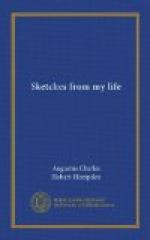I cannot help remarking on the very great inconvenience and distress that were entailed on the South through the want of almost every description of manufacture. The Southern States, having always been the producing portion of the Union, had trusted to the North, and to Europe for its manufactures. Thus, when they were shut out by land and by sea from the outer world, their raw material was of but little service to them. This fact tended, more than is generally believed, to weaken the Southern people in the glorious struggle they made for what they called and believed to be their rights,—a struggle, the horrors of which are only half understood by those who were not eye-witnesses of it. Whether the cause was good, whether armed secession was justifiable or not, is a matter regarding which opinions differ. But it is undeniable that all fought and endured in a manner worthy of a good and a just cause, and many were thoroughly and conscientiously convinced it was so. Such men as Lee, Stonewall Jackson, and others would never have joined any cause against their convictions; but it won’t do for a blockade-runner to attempt to moralise. So to return to my story.
My readers will be desirous of knowing what was the result of my speculation in Cockles and toothbrushes. Regarding the former, I am sorry to say that all my endeavours to induce my Southern friends to try their efficacious powers were of no avail, so I determined to take them with me to Nassau (if I could get there), thinking that I might find a market at a place where everyone was bilious from over eating and drinking, on the strength of the fortunes they were making by blockade-running; and there I found an enterprising druggist who gave me two chests of lucifer matches in exchange for my Cockles, which matches I ultimately sold in the Confederacy at a very fair profit. My toothbrushes being not in the slightest degree appreciated at Wilmington, I sent them to Richmond, where they were sold at about seven times their cost.
So ended my speculation. The vessel’s cargo consisted of blankets, shoes, Manchester goods of all sorts, and some mysterious cases marked ‘hardware,’ about which no one asked any questions, but which the military authorities took possession of. This cargo was landed, and preparations made for taking on board THE paying article in this trade, namely, cotton.
I never bought it in any quantity, but I know that the price in the Southern States averaged from twopence to threepence a pound, the price in Liverpool at that time being about half-a-crown.
We were anxious to try the luck of our run-out before the moon got powerful, so the cargo was shipped as quickly as possible. In the first place, the hold was stored by expert stevedores, the cotton-bales being so closely packed that a mouse could hardly find room to hide itself among them. The hatches were put on, and a tier of bales put fore and aft in every available spot on the deck, leaving openings




